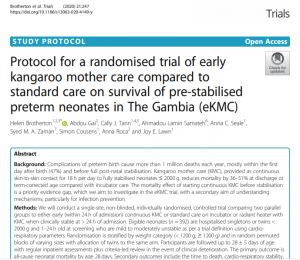
Background
Complications of preterm birth cause more than 1 million deaths each year, mostly within the first day after birth (47%) and before full post-natal stabilisation. Kangaroo mother care (KMC), provided as continuous skin-to-skin contact for 18 h per day to fully stabilised neonates ≤ 2000 g, reduces mortality by 36–51% at discharge or term-corrected age compared with incubator care. The mortality effect of starting continuous KMC before stabilisation is a priority evidence gap, which we aim to investigate in the eKMC trial, with a secondary aim of understanding mechanisms, particularly for infection prevention.
Methods
We will conduct a single-site, non-blinded, individually randomised, controlled trial comparing two parallel groups to either early (within 24 h of admission) continuous KMC or standard care on incubator or radiant heater with KMC when clinically stable at > 24 h of admission. Eligible neonates (n = 392) are hospitalised singletons or twins < 2000 g and 1–24 h old at screening who are mild to moderately unstable as per a trial definition using cardio-respiratory parameters. Randomisation is stratified by weight category (< 1200 g; ≥ 1200 g) and in random permuted blocks of varying sizes with allocation of twins to the same arm. Participants are followed up to 28 ± 5 days of age with regular inpatient assessments plus criteria-led review in the event of clinical deterioration. The primary outcome is all-cause neonatal mortality by age 28 days. Secondary outcomes include the time to death, cardio-respiratory stability, hypothermia, exclusive breastfeeding at discharge, weight gain at age 28 days, clinically suspected infection (age 3 to 28 days), intestinal carriage of extended-spectrum beta-lactamase producing (ESBL) Klebsiella pneumoniae (age 28 days), and duration of the hospital stay. Intention-to-treat analysis will be applied for all outcomes, adjusting for twin gestation.
Discussion
This is one of the first clinical trials to examine the KMC mortality effect in a pre-stabilised preterm population. Our findings will contribute to the global evidence base in addition to providing insights into the infection prevention mechanisms and safety of using this established intervention for the most vulnerable neonatal population.